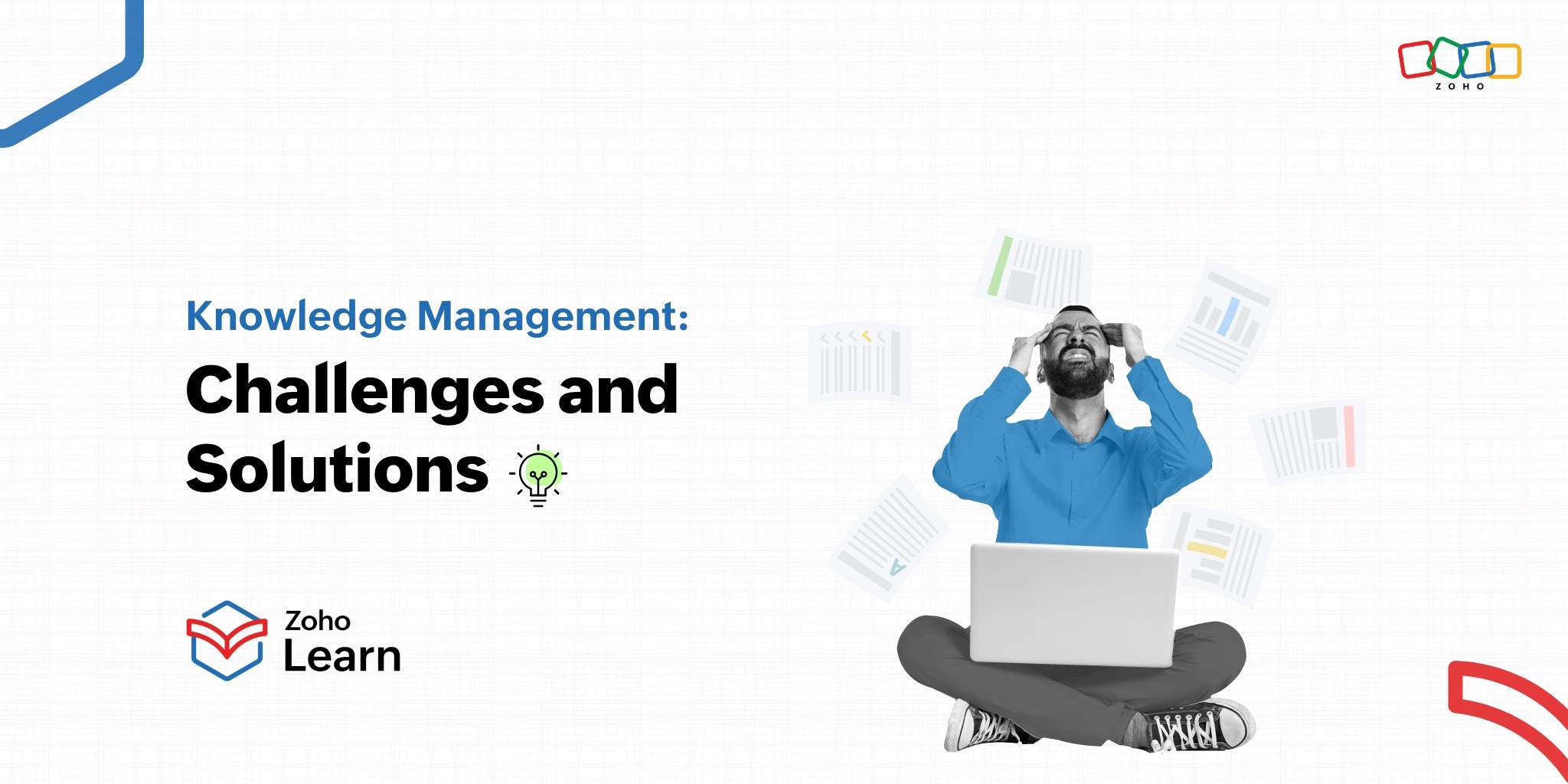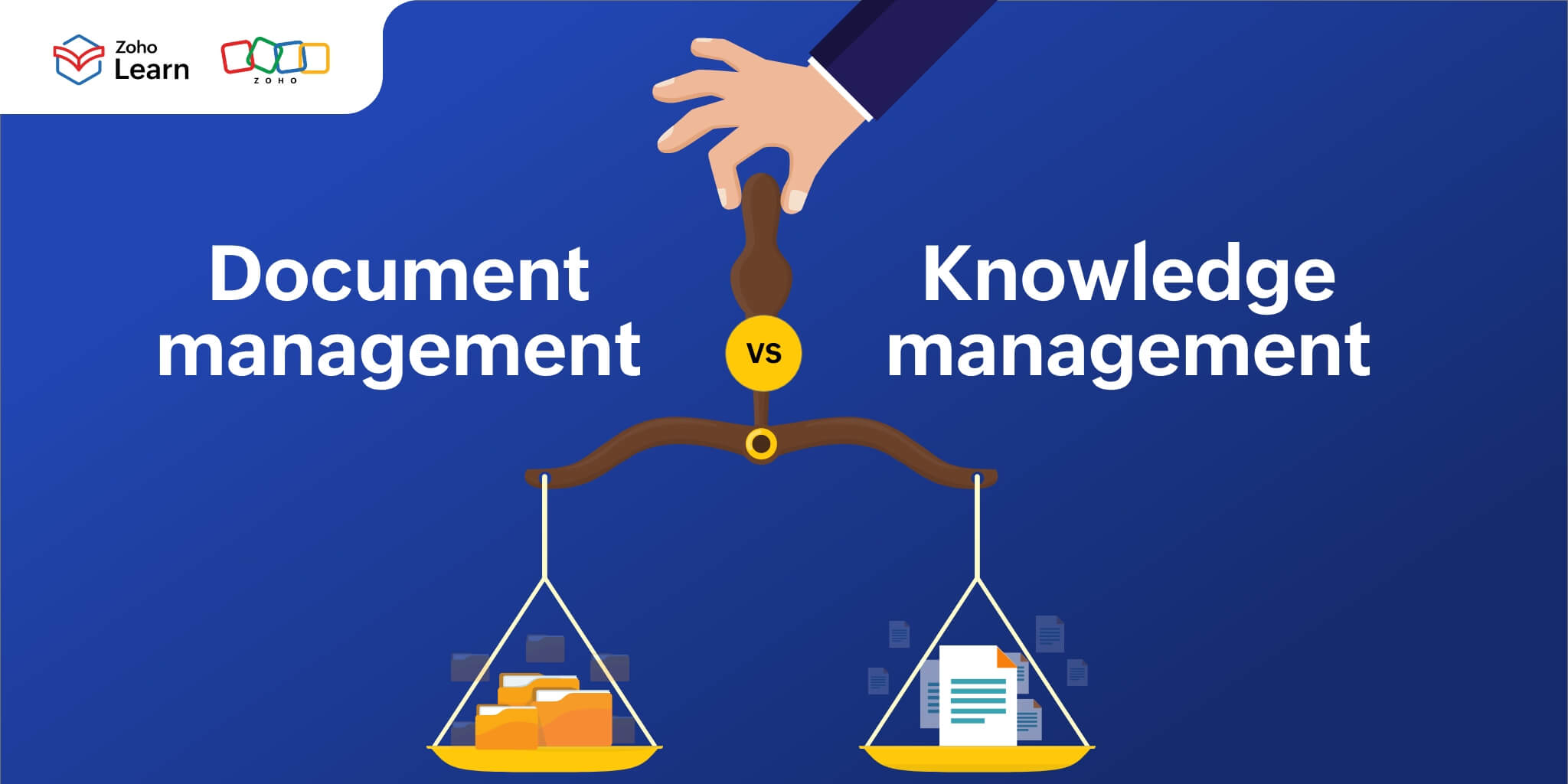- HOME
- Knowledge Management
- Knowledge management: Challenges and solutions
Knowledge management: Challenges and solutions
- Last Updated : April 8, 2025
- 9.6K Views
- 4 Min Read

Knowledge management plays a vital role in shaping the growth of an organization. It enables the storage and use of the knowledge that forms the basis of all future decisions of an organization. Efficient knowledge management helps employees access information quickly, enhancing the organization's productivity and success.
What is knowledge management?
Knowledge management is the process of capturing, organizing, sharing, and utilizing institutional knowledge and expertise. It helps retain critical information to ensure employees have access to the resources they need, increases the workforce’s overall knowledge, and improves productivity.
Why is knowledge management important?
Effective knowledge management facilitates quick access to best practices, project information, and key data. It enhances performance and decision-making, leading to improved efficiency and employee satisfaction.
Here are some of the benefits of knowledge management:
It encourages a culture of collaboration, allowing employees to share expertise and ideas, and work towards common goals.
Access to organized knowledge and information helps employees work more efficiently, avoiding duplication of effort and making better-informed decisions.
Employees feel empowered and engaged in their work, and experience a sense of fulfilment leading to employee retention.
It enables faster problem-solving and the generation of innovative ideas, leading to improved solutions and competitive advantage.
Having access to accurate and up-to-date knowledge supports informed decision-making at all levels of the organization.
It promotes a learning culture within the organization, fostering continuous learning and professional development.
It ensures that valuable information isn't lost when employees leave or retire, preserving critical knowledge for future use.
It effectively streamlines processes, leading to cost savings and reduced errors.
Challenges faced in knowledge management
Unsupportive technology
Knowledge management software should have the right features to support the requirements and strategy used in your organization. Outdated or inadequate systems may hinder knowledge-sharing and collaboration, making it difficult for employees to access and contribute to the knowledge base.
Lack of employee time
Employees may have daily workloads, deadlines, and priorities that limit the time available to contribute to knowledge management activities. This can make it challenging for employees to dedicate sufficient time to capture, document, and share their knowledge effectively.
Resistance to change
Implementing knowledge management initiatives often requires a cultural change within the organization. Some employees may resist changes to their established work practices and may be hesitant to adopt new knowledge-sharing tools or methods.
Duplicate or false information
When many users contribute to a knowledge base, it's crucial to ensure the quality and integrity of the knowledge management system. Without proper validation or verification, there's a possibility of inaccurate or redundant information being stored in the knowledge base.
Lack of management contribution
Successful knowledge management requires strong commitment and support from management. If leaders don't prioritize or allocate resources to knowledge management initiatives, employees may not actively participate or contribute their knowledge.
How to overcome challenges in knowledge management
By recognizing these challenges, organizations can create a plan to address them and create an environment that fosters and drives effective knowledge management practices.
Develop clear objectives
Establishing clear objectives is essential to guide your knowledge management efforts. Define specific goals and outcomes you want to achieve depending on your organization's needs to provide a focus and direction for your knowledge management initiatives.
Implement a strategy
Develop a well-defined knowledge management strategy that aligns with your organizational goals. Identify the key areas for knowledge management and outline the process, resources, and timelines required for successful implementation.
Train your employees
Provide training on effective knowledge capture, documentation, and sharing techniques to equip your employees to contribute effectively. Invest in training employees on using knowledge management tools and platforms to maximize their benefits.
Encourage a knowledge-sharing culture
Create an environment that values and encourages knowledge sharing to facilitate open communication and exchange of information. Foster a culture where employees feel safe and motivated to share their expertise and experiences.
Recognize employee contribution
Recognizing and appreciating employee contributions encourages continued engagement and participation in knowledge management activities. Acknowledge individuals or teams who consistently share valuable knowledge or contribute to improving the knowledge base with incentives, rewards, or simply with a public mention.
Deploy the right knowledge management tool
Select and implement a knowledge management tool that aligns with your organization's needs and objectives. Choose a tool that's easy to use, secure, and scalable, with integration capabilities to ensure it remains effective and efficient.
Wrapping up
Effective knowledge management minimizes redundant effort and enables employees to concentrate on creating value for the company. By implementing a comprehensive strategy and utilizing a knowledge management system, you can make knowledge accessible to all members of the organization, leading to increased profitability and overall business growth.


